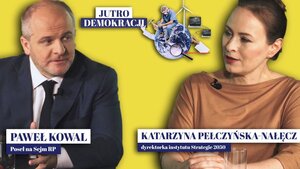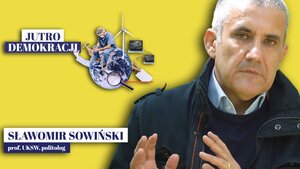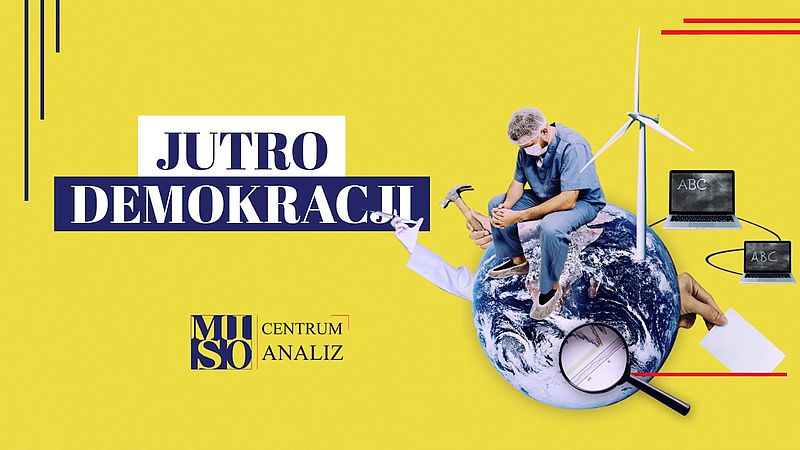Speakers' Corner - Democracy Tomorrow
As part of the "Democracy Tomorrow" topic, Paweł Kowal and Katarzyna Pełczyńska-Nałęcz had a presentation under the title Between East and West. Then we could listen to Sławomir Sowiński's speech under the title Will Democracy Survive?
According to Paweł Kowal, all authoritarian systems claim to be democratic, and almost all of them seek legitimacy in elections, and sometimes they are indeed elected in democratic elections. For a very long time the system is actually not democratic, the power is unchangeable under normal conditions, but because there are elections, people still believe that there is democracy. That moment of transition from democracy to authoritarianism consists of such a moment in history when there is still voting, but elections are no longer there. There is no possibility of competition, the oppositionists are subject to attacks of propaganda.
Katarzyna Pełczyńska-Nałęcz believes that in such a case the information space is closed, where actually already one side has a huge advantage in the media, and the other side wants to reach people, but it has got very narrow possibilities. Moreover, there is a myth of information pluralism due to the presence of social media. Ostensibly, there is no monopoly, but on the other hand, the authorities can obtain data on virtually everyone and hit them with personalized messages. To build this effectively requires money and access to data. This is what the Chinese have got. The Russians are also working on it, in fact they have imported the technology from China.
- In the U.S., it turned out that the problem was in a huge social disparity and inequality, which were so great that social cohesion was blown up. That caused social radicalism - and that resulted in the election of Trump. I think that in our country – but not on such a scale as in the U.S. - there is the same story - about divisions, about exclusions, about frustrations and people who felt that this democracy was not for them - Pełczyńska-Nałęcz said.
The experts agree that a profound overhaul of institutions awaits us. There is no going back to the state existing before. There is a need to build democracy in such a way that the strong elements from the past remain, and the weak ones that made this populist turn possible are corrected.
We invite you to watch a debate between Paweł Kowal and Katarzyna Pełczyńska-Nałęcz titled Between East and West

_ _ _ _ _
Does the democracy as we know it still have a future? In the age of the Internet and artificial intelligence, is the political project proven and popularized in the age of steam, iron railroad and industrial revolution still functional?
In the beginning it is worth mentioning the 19th-century parameters that were enshrined into the model of a parliamentary democracy, and considering how strong they are today. Only then can the above question be answered.
Prof. Sławomir Sowiński began the discussion by saying that the present day democracy would not have been possible without the middle class, which was born and developed only in the 19th century. At that time, there appeared great ideologies, political stories on how to build modernity, methods to mobilize mass voters and promote their needs. National identity was set in motion, followed by nations that became politically sovereign.
The democracy was born in the 19th century thanks to the growing middle class, but today, however, the middle class, which is losing its importance, stops being the foundation of social life. This is mainly due to the technological, social and economic revolution that took place in the 1990s.
First in the US, then in Europe, there emerged a phenomenon called the "revolt of the rich" – it is the process of the richest part of the society shutting down, getting out of public life and hiding in the private sphere of health care, education, security, etc. On the other hand, the pace of technological development caused a large part of the so-called lower middle class to fall out of the public services sector and the market sector. Thus, the middle class started shrinking from the both sides.
Many scholars remark that great ideologies are in crisis. The way of describing the 19th century political world, which was born as a commentary to the then political and economic revolutions, is inadequate today.
- Although it seems that these 19th century foundations of parliamentary democracy are in deep crisis in a lot of places, we see no alternative to this political project. With some adjustments, it still has a future - Prof. Sowiński said.
The present day democracy fulfills a range of vital nonpolitical, social roles, and, as yet, we do not see any other ways to satisfy those social needs. The democracy has also developed a certain political philosophy, into which freedom and equality among people, mainly the human respect, are enshrined. Democracy also creates space for social solidarity.
Democracy will survive as long as it finds a new way to traditional allies, which for the 19th century nascent democracy were the national identity, the family teaching responsibility for social issues as well as the religion, which at the birth of democracy was its ally.
We invite you to read Sławomir Sowiński's article titled Will Democracy Survive?

_ _ _ _ _
Paweł Kowal - Member of the Polish Parliament, PH degree in social sciences, Professor at the Institute of Political Studies of the Polish Academy of Sciences, historian, museologist, political scientist, editor of International Affairs. Deputy editor-in-chief of the Warsaw East European Review. He researches and publishes on issues relating to transformations in Central Europe and the USSR and the Eastern policy. Former Deputy Foreign Minister.
Katarzyna Pełczyńska-Nałęcz - sociologist and political scientist. She runs the Strategies 2050 Institute, which cooperates with the Poland 2050 movement. She served as undersecretary of state in the Ministry of Foreign Affairs and as Poland's Ambassador to the Russian Federation. After leaving the diplomatic service, she was in charge of the Open Europe program of the Stefan Batory Foundation, and later of the Foundation's think tank, Forum Ideas.
Sławomir Sowiński - political scientist, PhD in social sciences in the field of political science, university teacher, professor at Cardinal Stefan Wyszyński University. He specializes in research on religion and politics, political ethics, political thought and contemporary political processes. He is a member of the WIĘŹ Laboratory Team and a regular contributor to the quarterly magazine WIĘŹ. Also, he is the author and editor of numerous books, and his writings have appeared in "Rzeczpospolita," "Tygodnik Powszechny" and "Gość Niedzielny," among others.


